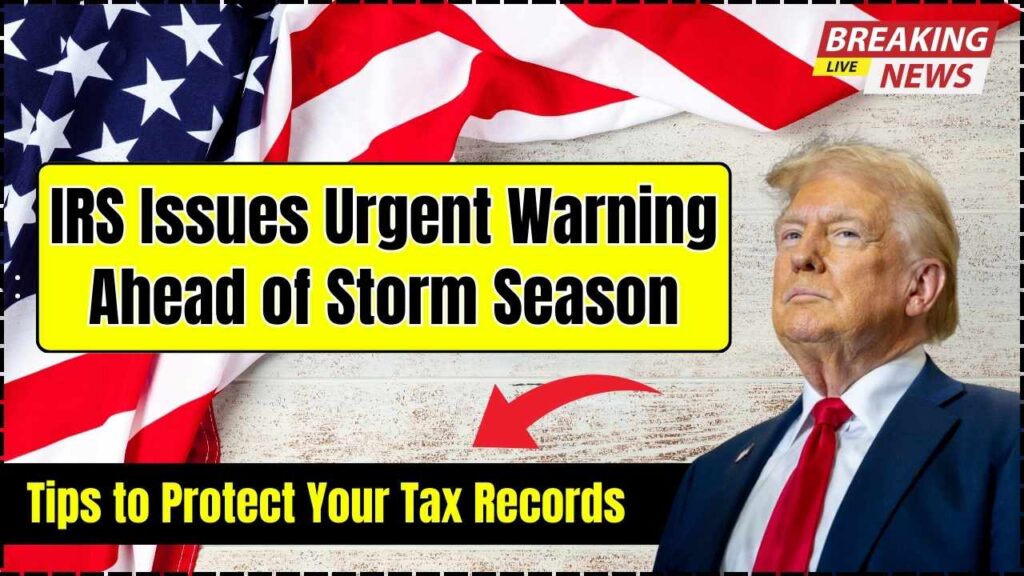IRS Issues Urgent Warning Ahead of Storm Season: As storm season ramps up across the United States, the Internal Revenue Service (IRS) has issued an urgent warning to taxpayers: Now is the time to protect your tax records and essential financial documents before disaster strikes. Severe weather events like hurricanes, floods, tornadoes, and wildfires can cause devastating losses — including the destruction of crucial records needed to file taxes, claim deductions, or access federal relief.

The IRS emphasizes that preparedness is key, and even simple actions today can prevent major complications in the aftermath of a disaster. This guide breaks down what you need to know and do to ensure you’re protected.
IRS Issues Urgent Warning Ahead of Storm Season
| Topic | Details |
|---|---|
| IRS Warning | Issued ahead of storm season to encourage protective steps for safeguarding tax records |
| Common Threats | Hurricanes, floods, tornadoes, wildfires, earthquakes |
| Top IRS Tips | Secure physical records, digitize documents, inventory valuables, verify payroll services |
| IRS Publications | Publication 584 – Personal property inventory guide |
| Official Guidance Website | irs.gov/disaster |
| Recommended Tools | Fireproof document bags, cloud storage, waterproof safes |
Storms and disasters can strike without warning, but your ability to recover financially doesn’t have to be compromised. By securing paper documents, digitizing records, and preparing an inventory, you dramatically reduce the risk of being caught unprepared. Whether you’re a family managing household records or a business overseeing payroll, these tips from the IRS can help you stay protected and tax-ready in any situation.
Why the IRS Issues Urgent Warning Ahead of Storm Season?
Every year, natural disasters displace families, damage property, and wipe out irreplaceable documents. The Federal Emergency Management Agency (FEMA) reports that over 40% of Americans live in counties that experienced a climate-related disaster in 2022 alone. (fema.gov)
From the IRS perspective, these disasters can lead to significant delays or issues in:
- Filing tax returns
- Claiming casualty losses
- Verifying past income and deductions
- Qualifying for emergency tax relief
That’s why the IRS is urging individuals and businesses to adopt proactive protection measures as part of their disaster preparedness plans.
1. Secure Your Paper Tax Records
Use Waterproof and Fireproof Storage
Place essential paper documents in water-resistant, fireproof containers. Examples of must-keep documents include:
- Tax returns from the past 3–7 years
- Social Security cards
- Birth and marriage certificates
- Insurance policies
- Property deeds and vehicle titles
Many families opt for a fireproof document bag or safe, which can be purchased from office supply stores or online retailers like Amazon.
Store Copies Offsite
Consider keeping a second set of physical copies in a safety deposit box or at a trusted family member’s home. The goal is to prevent total loss if your residence is impacted.
2. Digitize Everything: Backup in the Cloud
Going digital is a major step forward in document security. Here’s how:
Scan and Save
Use a scanner or smartphone app to digitize documents. Then save them in multiple places:
- Cloud storage (e.g., Google Drive, Dropbox, OneDrive)
- External hard drive
- USB flash drive (stored securely)
The IRS supports digital recordkeeping and considers electronic copies legally acceptable for tax purposes.
“Having secure digital copies means faster recovery if the originals are destroyed,” says IRS Disaster Relief Coordinator Emily Fisher.
3. Make a Home Inventory of Valuables
After a disaster, it can be difficult to remember what you lost. That’s why the IRS and FEMA recommend creating a detailed home inventory.
Use IRS Publication 584
The IRS offers Publication 584, a downloadable workbook that helps you:
- List valuables room-by-room
- Note estimated values
- Attach photos or video evidence
Pro Tip
Take a quick video walkthrough of your home and save it to the cloud. Narrate the footage to document specific items, brands, and purchase dates.
4. Know How to Reconstruct Records If Lost
If a disaster damages or destroys your records, don’t panic. The IRS provides resources to help you reconstruct your information.
Where to Start:
- Request a tax transcript at irs.gov/transcript
- Contact your bank or financial institution for transaction history
- Ask your employer or payroll provider for past pay stubs or W-2 forms
Accurate reconstruction is crucial for filing amended returns or applying for tax relief under federally declared disasters.
5. Check Your Payroll Service Provider (For Businesses)
Businesses that outsource payroll functions should confirm that their payroll service provider has a fiduciary bond in place. This bond protects you if the provider fails to deposit withheld taxes.
The IRS recommends:
- Requesting written confirmation of bonding
- Reviewing the provider’s disaster recovery plan
- Keeping internal backups of payroll data
“Businesses remain liable for tax deposits, even if a third-party provider fails to remit them,” warns the IRS.
$6,000 Stimulus Approved for 2025 – Are You on the List for $500 Monthly Checks?
Social Security Enhancements in 2025: Review What Has Changed So Far!
Federal Reserve Turns Down Trump’s Request to Cut Rates — Powell Explains Why
Bonus Tip: Sign Up for IRS Email Alerts
Stay informed about disaster-related tax relief by subscribing to IRS email alerts. You’ll receive real-time updates about deadlines, extensions, and assistance programs.
Tools and Products to Consider
Here are some practical tools that can help you protect your documents and data:
- Zoolz Cloud Backup: Reliable long-term storage for personal and business files
- SentrySafe Fireproof Safe: Protects paper records and digital media from fire and flooding
- Fireproof Document Bag: Lightweight, portable protection for important documents
- Google Drive or Dropbox: Easy cloud-based document management and sharing
FAQs On IRS Issues Urgent Warning Ahead of Storm Season
What if I lose all my tax records in a disaster?
You can request a tax transcript from the IRS and contact banks, employers, and other institutions to help reconstruct your records.
Are digital records accepted by the IRS?
Yes. Electronic copies of tax documents are legally valid. The IRS encourages secure digital backups.
Can I claim losses on my tax return after a disaster?
Yes. In federally declared disaster zones, you may claim casualty losses. Learn more on the IRS Disaster Relief page.
Do businesses need to take additional steps?
Businesses should verify the credentials and bonding of payroll providers and create both on-site and off-site data backups.
How do I know if I’m in a disaster area?
Visit FEMA’s disaster page for updated maps and declarations.








